What are adverbs of frequency? And how are they used? Why are adverbs grouped into a category called “of frequency” and not just regular adverbs? These are all great questions that will get answered in this comprehensive guide.
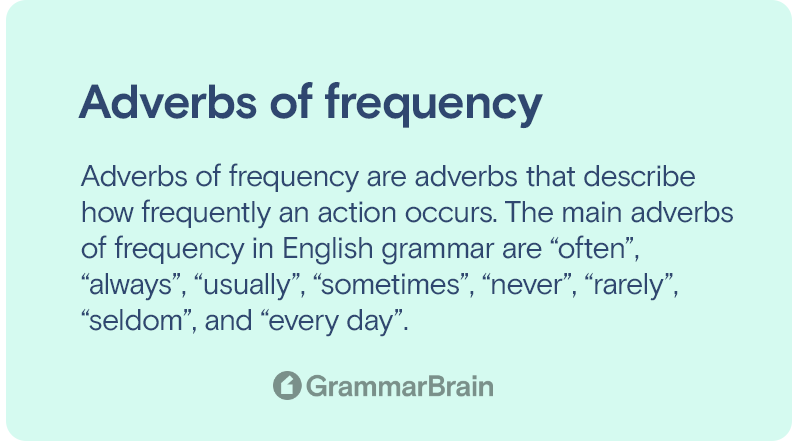
What are adverbs of frequency?
Adverbs of frequency are adverbs that describe how frequently an action occurs. The main adverbs of frequency in English grammar are “often”, “always”, “usually”, “sometimes”, “never”, “rarely”, “seldom”, and “every day”.
Types of adverbs of frequency
Adverbs of frequency are of two types – definite frequency and indefinite frequency.
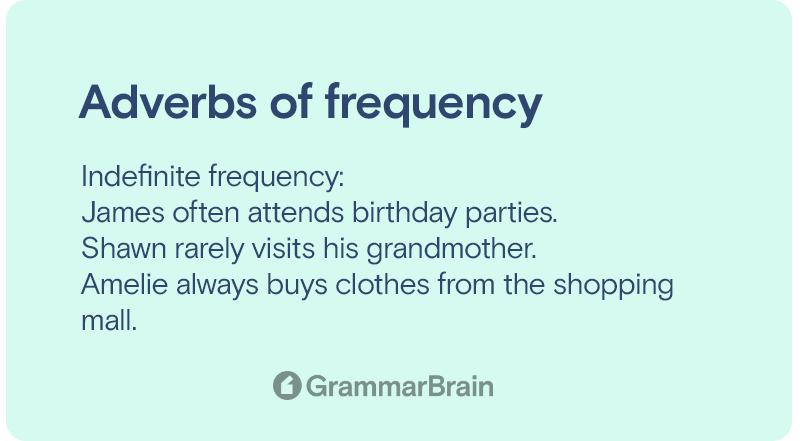
Indefinite frequency
The indefinite frequency doesn’t specify how long the action occurs. Often, always, and usually are some adverbs of indefinite frequency. Here are a few examples.
- James often attends birthday parties.
- Shawn rarely visits his grandmother.
- Amelie always buys clothes from the shopping mall.
- John sometimes eats bananas and cereals for breakfast.
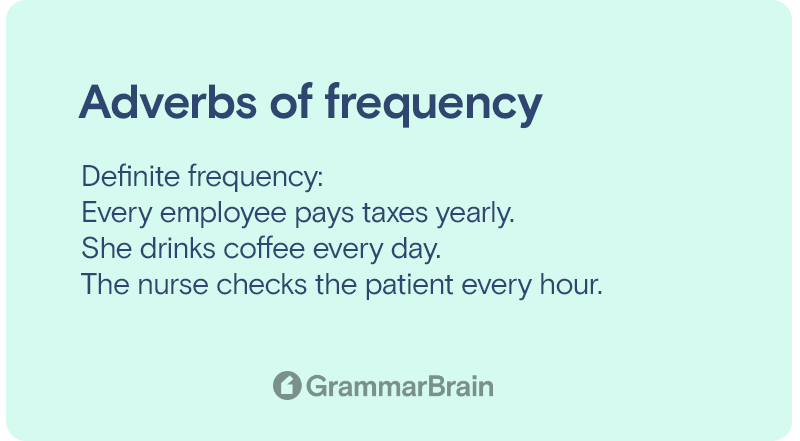
Definite frequency
The definite frequency specifies the exact time frame an action occurs. A few adverbs of definite frequency are daily, weekly, hourly, once, and twice. Here are a few examples.
- Every employee pays taxes yearly.
- She drinks coffee every day.
- The nurse checks the patient every hour.
- He visits his grandparents weekly.
Structure of adverbs of frequency
Adverbs of indefinite frequency structure
Adverbs of indefinite frequency are positioned between the subject and the verb. The structure is “Subject + adverb of indefinite frequency + verb + other words”. Here are a few examples.
- John occasionally eats rice with his hands. Here, “occasionally” is the adverb that is positioned between the subject “John” and the verb “eats”.
- Shawn often visits Paris. Here, “often” is the adverb placed between the subject “Shawn” and the verb “visits”.
Some adverbs like occasionally, sometimes, and usually can start at the beginning of a sentence. For example, “Sometimes John visits me at home in the afternoon”. Besides this, these adverbs can also be positioned at the end of a sentence. For example, “I attend my friend’s birthday parties occasionally”.
Adverbs of definite frequency structure
Adverbs of definite frequency typically come at the end of a sentence. The structure is “Subject + verb + definite adverb”. Here are a few examples.
- John pays salaries to his employees monthly. Here, the “monthly” definite adverb comes at the end of the sentence.
- She commutes to her office by bus daily. Here, the “daily” definite adverb comes at the end of the sentence.
Some adverbs like every day can be positioned at the start of a sentence. For example, “Every day, she drinks coffee in the morning”.
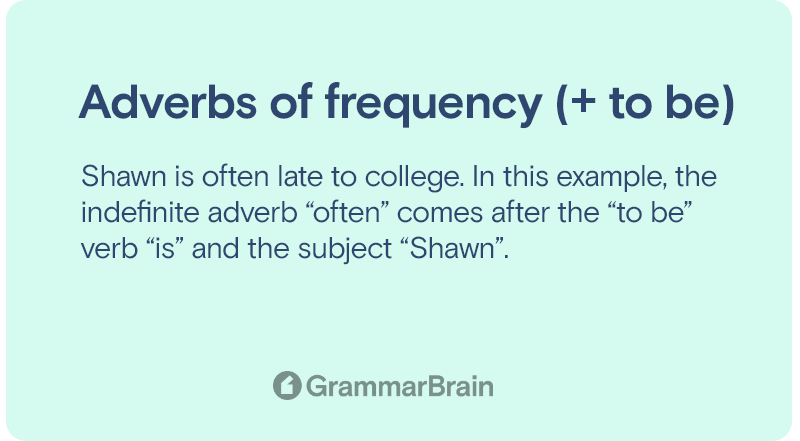
Adverbs of frequency + “To Be” verb
In sentences that make use of the verb “to be”, the adverbs of frequency come after the “to be” verb. The formula is “Subject + to be verb + adverb of frequency + other words”.
Examples:
- Shawn is often late to college. In this example, the indefinite adverb “often” comes after the “to be” verb “is” and the subject “Shawn”.
- Emma and Tom are monthly visitors to the tennis club. In this example, the definite adverb “monthly” comes after the “to be” verb “are” and the subjects “Emma” and “Tom”.
- The manager is always in a pensive mood. In this sentence, the indefinite adverb “always” comes after the “to be” verb “is” and the subject “manager”.
Adverbs of frequency + Auxiliary verbs
In sentences that use auxiliary verbs, the adverbs of frequency come between the auxiliary verb and the main verb. The formula is “Subject + auxiliary verb + adverb of frequency + main verb + other words”.
Examples:
- Henry had rarely visited my new house. Here, the indefinite adverb “rarely” is positioned between the auxiliary verb “had” and the main verb “visited”.
- She had once received her friend at the airport. In this example, the definite adverb “once” comes after the auxiliary verb “had” and before the main verb “received”.
- They have never visited New York. In this sentence, the indefinite adverb “never” comes after the auxiliary verb “have” and before the main verb “visited”.
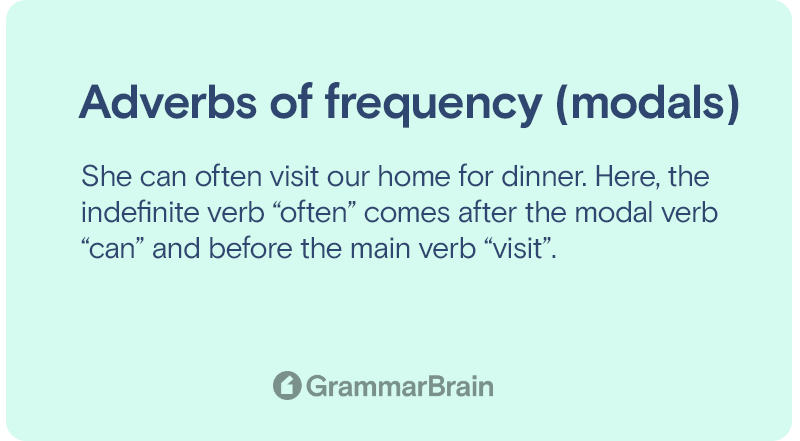
Adverbs of frequency with modal verbs
In sentences that have modal verbs, the adverb of frequency comes after the modal verb and before the main verb. The structure is “Subject + modal verb + adverb of frequency + main verb + other words”.
Examples:
- She can often visit our home for dinner. Here, the indefinite verb “often” comes after the modal verb “can” and before the main verb “visit”.
- They should once in a month consult the doctor. Here, the definite verb “once” is positioned between the modal verb “should” and the main verb “consult”.
Forming questions with adverbs of frequency
Here are a few examples of questions with adverbs of frequency.
- How often do you go to the gym?
- Do you rarely visit the shopping mall?
- Does he occasionally eat at a restaurant?
FAQs
1. What are the different types of adverbs in English grammar?
Here are the different types of adverbs in English grammar:
- Adverbs of degree
- Adverbs of frequency
- Adverbs of time
- Adverbs of manner
- Adverbs of place
- Conjunctive adverbs
2. Which indefinite adverb is used in negative sentences?
The indefinite adverb “ever” is typically used in negative statements. Here is an example.
Example:
- She hasn’t ever visited London.
Sources
- Adverbs of Frequency English Grammar
- How to Teach Adverbs of Frequency in English – Wall Street English
- Adverbs of Frequency | Grammar | EnglishClub
- Adverbs of Frequency – List of Examples & Exercises
Inside this article
Fact checked:
Content is rigorously reviewed by a team of qualified and experienced fact checkers. Fact checkers review articles for factual accuracy, relevance, and timeliness. Learn more.
Core lessons
Glossary
- Abstract Noun
- Accusative Case
- Anecdote
- Antonym
- Active Sentence
- Adverb
- Adjective
- Allegory
- Alliteration
- Adjective Clause
- Adjective Phrase
- Ampersand
- Anastrophe
- Adverbial Clause
- Appositive Phrase
- Clause
- Compound Adjective
- Complex Sentence
- Compound Words
- Compound Predicate
- Common Noun
- Comparative Adjective
- Comparative and Superlative
- Compound Noun
- Compound Subject
- Compound Sentence
- Copular Verb
- Collective Noun
- Colloquialism
- Conciseness
- Consonance
- Conditional
- Concrete Noun
- Conjunction
- Conjugation
- Conditional Sentence
- Comma Splice
- Correlative Conjunction
- Coordinating Conjunction
- Coordinate Adjective
- Cumulative Adjective
- Dative Case
- Determiner
- Declarative Sentence
- Declarative Statement
- Direct Object Pronoun
- Direct Object
- Diction
- Diphthong
- Dangling Modifier
- Demonstrative Pronoun
- Demonstrative Adjective
- Direct Characterization
- Definite Article
- Doublespeak
- False Dilemma Fallacy
- Future Perfect Progressive
- Future Simple
- Future Perfect Continuous
- Future Perfect
- First Conditional
- Irregular Adjective
- Irregular Verb
- Imperative Sentence
- Indefinite Article
- Intransitive Verb
- Introductory Phrase
- Indefinite Pronoun
- Indirect Characterization
- Interrogative Sentence
- Intensive Pronoun
- Inanimate Object
- Indefinite Tense
- Infinitive Phrase
- Interjection
- Intensifier
- Infinitive
- Indicative Mood
- Participle
- Parallelism
- Prepositional Phrase
- Past Simple Tense
- Past Continuous Tense
- Past Perfect Tense
- Past Progressive Tense
- Present Simple Tense
- Present Perfect Tense
- Personal Pronoun
- Personification
- Persuasive Writing
- Parallel Structure
- Phrasal Verb
- Predicate Adjective
- Predicate Nominative
- Phonetic Language
- Plural Noun
- Punctuation
- Punctuation Marks
- Preposition
- Preposition of Place
- Parts of Speech
- Possessive Adjective
- Possessive Determiner
- Possessive Case
- Possessive Noun
- Proper Adjective
- Proper Noun
- Present Participle
- Prefix
- Predicate



